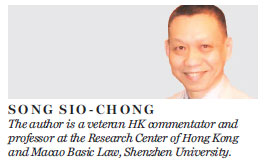HK needs to understand new law
Updated: 2015-07-09 07:59
By Song Sio-chong(HK Edition)
|
|||||||
Song Sio-chong writes that while the National Security Law hasn't been added to the Basic Law, Hong Kong people are bound to uphold the spirit of national sovereignty
The Standing Committee of the National People's Congress (NPCSC) passed the new National Security Law as the Hong Kong SAR was celebrating its Establishment Day on 1 July. Articles 11 and 40 of the new law expressly mentioned "Hong Kong compatriots" and "HKSAR", respectively, on the issue of national security matters.
Some people doubt whether the new law is part of the laws in force in Hong Kong. At the same time, some people believe that the NPCSC, in bypassing the Legislative Council (LegCo), directly imposed the Basic Law's Article 23 legislation on Hong Kong. These matters need to be addressed.
Under "One Country, Two Systems", the laws in force in Hong Kong include, generally, the Basic Law, the laws previously in force in Hong Kong before July 1, 1997 (which were not declared as contravening the Basic Law) and laws enacted by the LegCo. In addition, Article 18(3) of the Basic Law provides for the application of certain national laws in Hong Kong - that "national laws shall not be applied in the Hong Kong Special Administrative Region except for those listed in Annex III to this Law".
Since the new law has not been added to Annex III of the Basic Law, it is not part of Hong Kong laws at present. It does not, however, follow that the new law should not have and does not have any legal implications in Hong Kong. The extraterritorial effect of a law by "nationality principle" may be explained by the following examples.
The United States tax laws are not part of Hong Kong law, but those who have investments in the local banks in Hong Kong may be required to declare whether or not they are US citizens. This is because the US government needs the information due to its requirement that those with US nationality pay their income tax even though such income may have derived from territories outside the jurisdiction of the US.
In the famous trial of Earl Russell in 1901, the Second Earl Russell - a British national, member of the House of Lords and the elder brother of philosopher Bertrand Russell - was tried and convicted of bigamy by his law lord peers, notwithstanding that his second marriage took place outside the United Kingdom.
And, in a more similar context, the Suppression of Terrorist Bombing Act of Sri Lanka enables the High Court of the country to try a Sri Lankan national who bombs a foreign country.
Such legal practices are nothing new to modern civilization, but appear strange to many Hong Kong people due to the lack of civic education after 1997. Of course, I do not mean that Chinese citizens should pay income tax to Beijing, as Article 106(3) of the Basic Law provides that "the Central Government shall not levy taxes in the HKSAR". Tax crimes in Hong Kong will not be punished on the mainland, but certain criminal offences against national security may not be excluded.
Faced with various radical movements including and subsequent to the illegal "Occupy Central" movement which serve to destabilize our society and affect national security, all Chinese citizens in Hong Kong need to be reminded they have the obligation to uphold national sovereignty, unity and territorial integrity.
There are more than 5 million people who are permanent residents with Chinese nationality holding passports of the HKSAR of China. If they can understand their obligations and the common interest, then instability in our society will be reduced and national security assured. That is perhaps why Article 11(3) of the new law emphasizes that all our fellow citizens and countrymen - including Hong Kong, Macao and Taiwan compatriots - have to safeguard our national security.
Furthermore, Article 40(3) of the new law has imposed the duty to uphold national security on the HKSAR Government. The scope of such work is highly comprehensive and with wide coverage, as indicated in Chapter 2 of the new law. While the new law may not be listed in Annex III, the local government is duty-bound to work together with the central government on national security whether implemented by local legislation, policy adjustment, or the enforcement of various existing laws.
Reading the new law, I have no doubt that the legislation is administrative in nature and cannot be regarded as criminal law. Not being part of the laws of Hong Kong, the law may not punish any criminal offences either, let alone crimes against national security.
Crimes against national security occurring in Hong Kong can be, however, punished either in Hong Kong by applicable criminal law here, or on the mainland by criminal law there, by the operation of "national principle" with limitation to certain crimes against national security. To avoid the latter situation, the NPCSC seems to be urging the HKSAR Government to launch the legislation of Article 23 of the Basic Law, the obligation being outstanding since July 1, 1997 - or for 18 years since the handover - whereas Macao fulfilled its responsibility in 2009, 10 years after its handover.

(HK Edition 07/09/2015 page9)